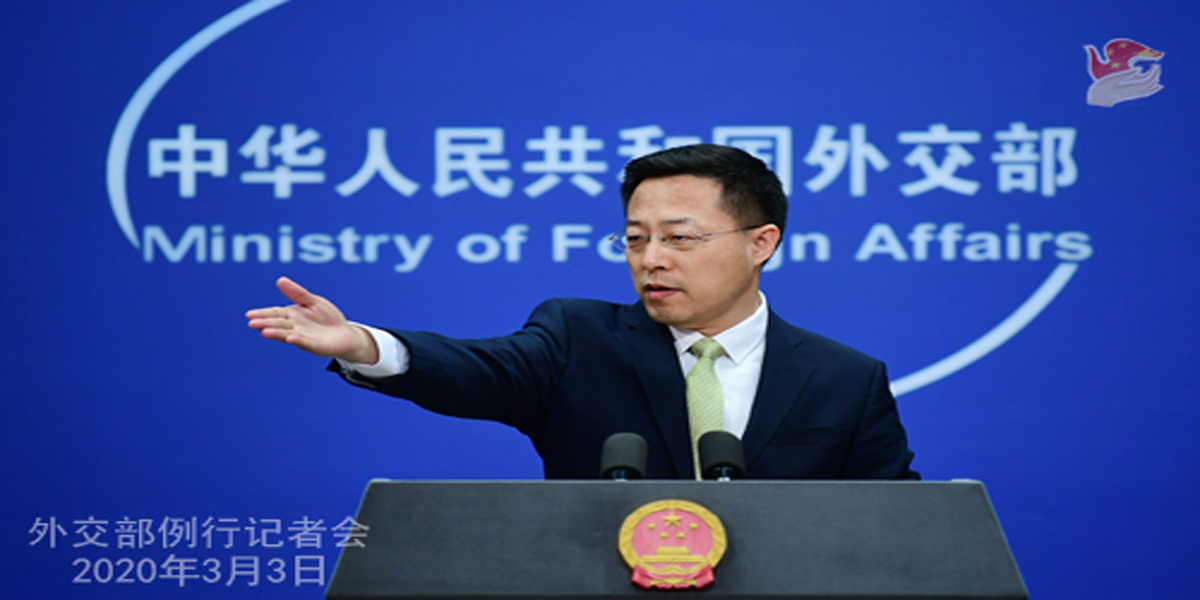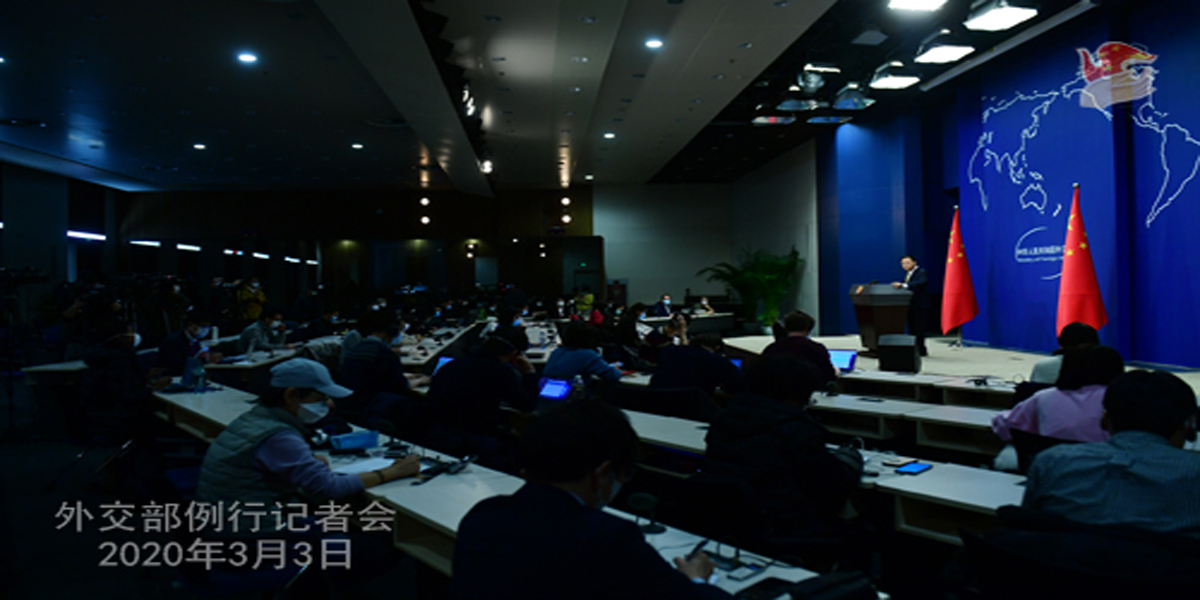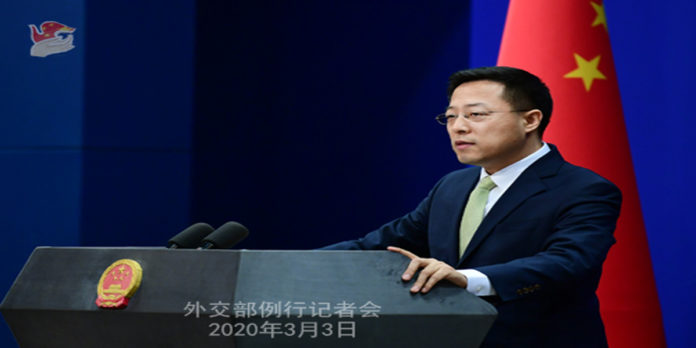I’d like to share with you some latest figures. According to the statistics from the National Health Commission this morning, March 2 saw 2,742 patients cured and discharged from hospital in China’s mainland, bringing the tally to 47,204.
Q: On March 2 local time, the US State Department announced that the US government will cap the number of Chinese citizens permitted to work for the five Chinese media groups that were designated as foreign missions, effective March 13th. What is your comment?

A: The US State Department waged this political crackdown on the US offices of the Chinese media out of the Cold War mentality and ideological prejudice on shaky ground. China firmly opposes and strongly condemns that.
Chinese journalists stationed in the US have been strictly abiding by US laws and regulations and carrying out news reporting under the principle of objectivity, fairness, truthfulness and accuracy. Their professionalism is well recognized. The US side has no basis and reason to take such an action against Chinese journalists.
The US side has been so entrenched in its Cold War mentality and ideological prejudice that it has escalated its actions from listing the Chinese media as “foreign agents” to designating them as “foreign missions”, and now to capping the number of their Chinese employees which means de-facto “expulsion” in a limited time. Because of their mounting oppression, Chinese journalists’ normal reporting activities, the reputation of the Chinese media and normal people-to-people exchanges between the two sides have been gravely damaged. While priding itself on freedom of press, the US now obstructs the Chinese media from doing their job. Such a two-faced behavior exposed its hypocrisy in so-called freedom of press, nothing short of double standards and hegemonic bullying.
Considering where the China-US relationship now stands, what the US has done will have serious negative impacts and damage bilateral relations. We urge the US to immediately change its course and correct its wrongdoings. The Chinese side reserves the right to respond and take further actions.
Q: As President of the UN Security Council for the month of March, how will China discharge its duties and what kind of role will it play? What are the priorities?
A: China has assumed Presidency of the UN Security Council for March. This month, the Security Council will discuss regional hotspot issues such as Afghanistan, Syria, Sudan’s Darfur and Somalia. China intends to convene three open debates on upholding multilateralism, combating terrorism and extremism in Africa, and strengthening peacekeeping capacity building. Yesterday in his press briefings in New York, Permanent Representative of China to the UN Ambassador Zhang Jun elaborated on five priorities during China’s presidency, namely, strengthening multilateralism, supporting Africa in promoting peace and development, tackling challenges in peacekeeping more effectively, promoting political settlement of regional hotspot issues, and improving the working method of the Security Council.
Faced with the fluid and complex international landscape, the world needs multilateralism and a stronger UN and Security Council more than ever. As President of the Council for March, China will act responsibly and constructively to enhance solidarity and cooperation in the Council to contribute more to world peace and security. We also expect support from all parties so that together we can fulfill the tasks on the agenda for the month.
Q: There have been more than 8,000 confirmed COVID-19 cases outside China. WHO Director-General Tedros Adhanom Ghebreyesus said yesterday that the number of cases reported outside China over the past 24 hours is almost nine times of that in China. You said yesterday that the overall situation in China is getting better and that China is working actively with others at regional and global levels. I wonder what assistance China has offered to affected countries?
A: We note the remarks by Director-General Tedros. China is following closely the global developments of the epidemic and relates deeply to the difficulties of some countries where the outbreak is getting more severe.

As we speak, China’s prevention and control efforts have produced visible progress, but this is no time to relax as we are still in a critical stage. Currently, cases have been reported in many countries, and some of those countries are facing an increasingly severe situation. It is of greater importance and urgency for countries to enhance communication and cooperation in public health security. China has been in communication with other sides. We have provided testing reagents to Pakistan, Japan, the AU, among others and shared diagnostic and therapeutic solutions with many countries. The Red Cross Society of China and many Chinese enterprises delivered reagents to Iran and African countries. We also sent a volunteer expert team to Iran. While fighting the epidemic at home, we will continue working with other sides and offer them assistance to the best of our capabilities.
China stands ready to step up cooperation in the health sector with the WHO and relevant countries, especially the ones seriously affected by COVID-19. We will fight together for the final victory over the virus.
Q: US officials say the restriction on Chinese media is not “linked to any particular incident”, but is to address “a very longstanding negative trend in the treatment of the press” in China. The cap the US set for Chinese personnel in these media agencies is 100, while the total number of registered American journalists in China is no more than 100, so this decision follows the principle of “reciprocity” the Trump administration seeks. If China makes further negative response, the US will act, too. All options are on the table. Is China prepared for a more intense situation? And what is your comment on that?
A: “Reciprocity” is their mantra, isn’t it? But I want to remind you of a few facts.
First, China has never instituted any caps on the number of offices and employees of US media in China. It is their own choice to make on how many people they want to send here, not a result of China’s restriction. As far as I know, since 2018, the US has been restricting Chinese journalists going to the US by rejecting and delaying issuance of their visa. At least 21 journalists have been denied visa since last year. On top of all that, this time, the US has decided to “expel” 60 Chinese employees of these Chinese media in the US, under the pretext of capping their number. Can this be called “reciprocity”?
Second, there are only 9 Chinese media agencies in the US while they have 29 American media groups here in China. Can this be called “reciprocity”?
Third, regarding the policy of visas for media personnel and visa fees, American journalists stationed in China can make multiple entries as long as their visa remains valid. But Chinese journalists have to reapply for visa if they leave for a short stay or for visiting family back in China, because of their single-entry visa, thanks to the discriminatory policies the US specifically instituted for the Chinese journalists stationed in the US. Not to mention they have to spend as much as 354 dollars each time they apply for one, more than double what we charge of the American side. Can this be called “reciprocity”?
Fourth, the US wants “reciprocity” with us. Does it seek such reciprocity with other countries’ media agencies, too?
The reciprocity they cannot stop talking about is in fact their exclusion of Chinese media out of prejudice and discrimination. The US is guilty of foul play first. We will simply do what we have to do.
Q: Egypt’s Minister of Health and Population Hala Zayed visited China as special envoy of the Egyptian President on March 2. How does China see the visit at this special time amid the outbreak?
A: As the Chinese people’s fight against the epidemic comes to a critical juncture, President Abdul Fatah Al-Sisi sent Minister Hala Zayed as his special envoy to express sympathies and support and bring medical supplies to China. It shows the high emphasis Egypt attaches to relations with China and its deep friendship towards the Chinese people. We’d like to express our appreciation and thanks. During the Minister’s visit, she met with Vice Chairman Chen Zhu of the Standing Committee of the National People’s Congress and officials from the National Health Commission. The two sides held in-depth exchange of views on cooperation in the health sector. China also shared with the Egyptian side information on the epidemic and its prevention and control experience.
Q: You just talked about foreign countries providing aid to China. I know many of them have lent a helping hand. Could you update us on foreign assistance China received?
A: At the critical moment when it is combating COVID-19 with all-out efforts, China receives sincere and friendly assistance from the international community. We will never forget this and would like to express our appreciation. We have full confidence and capability in winning this battle against the virus.
According to what we learned through diplomatic channels, as of March 2, 62 countries and seven international organizations have pledged epidemic prevention and control supplies to China. To be specific, supplies from 46 countries and six international organizations have arrived in China. Sixteen countries and one international organization announced they would provide prevention and control supplies. In addition, 12 countries and two international organizations have provided or announced they would provide food, cash and other forms of material support to China.
At present, the epidemic response is at the most crucial stage, and many countries are also facing the threat of the epidemic. In the spirit of a community with a shared future for mankind, while making continued efforts for prevention and control at home, China will strengthen cooperation at regional and international level, timely share information and experience, and coordinate policies and resources with other countries and the WHO in this battle against the epidemic until altogether we win a victory around the globe.
Q: Just going back to the cap on Chinese journalists in the US. What further action is China considering? Would it consider expelling more American journalists from China or capping the number of American journalists or news outlets that can work in China?
A: I stated China’s position earlier. We urge the US side to immediately stop its wrong actions and provide convenience for the normal operation of Chinese media in the US. We reserve the right to respond and take further actions.
Q: Is there any update on President Xi Jinping’s visit to Japan?
A: The two sides have been in close communication regarding President Xi’s visit to Japan to foster enabling conditions and a favorable atmosphere and make sound preparations. We will keep you updated if there’s anything new.

